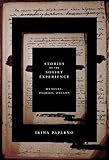Stories of the Soviet experience : memoirs, diaries, dreams / Irina Paperno.
Material type: TextSeries: Publication details: Ithaca : Cornell University Press, (c)2009.Description: 1 online resource (xv, 285 pages)Content type:
TextSeries: Publication details: Ithaca : Cornell University Press, (c)2009.Description: 1 online resource (xv, 285 pages)Content type: - text
- computer
- online resource
- 9780801459115
- 9780801448393
- Soviet experience : memoirs, diaries, dreams
- PG3091 .S767 2009
- COPYRIGHT NOT covered - Click this link to request copyright permission: https://lib.ciu.edu/copyright-request-form
| Item type | Current library | Collection | Call number | URL | Status | Date due | Barcode | |
|---|---|---|---|---|---|---|---|---|
 Online Book (LOGIN USING YOUR MY CIU LOGIN AND PASSWORD)
Online Book (LOGIN USING YOUR MY CIU LOGIN AND PASSWORD)
|
G. Allen Fleece Library ONLINE | Non-fiction | PG3091.9.93 (Browse shelf(Opens below)) | Link to resource | Available | ocn726824345 |
Includes bibliographies and index.
Frontmatter -- Contents -- Acknowledgments -- Introduction -- Part I. Memoirs and Diaries Published at The End of The Soviet Epoch: An Overview -- Publishers, Authors, Texts, Reader, Corpus -- The Background: Memoir Writing and Historical Consciousness -- Connecting the "I" and History -- Revealing the Intimate -- Building a Community -- Writing at the End -- Qualification: The "I" in Quotation Marks -- Excursus: Readers Respond in LiveJournal -- Concluding Remarks -- Part II. Two Texts: Close Readings -- 1. Lidiia Chukovskaia's Diary of Anna Akhmatova's Life: "Intimacy and Terror" -- 2. The Notebooks of the Peasant Evgeniia Kiseleva: "The War Separated Us Forever" -- Part III. Dreams of Terror: Interpretations -- Comments on Dreams as Stories and as Sources -- Andrei Arzhilovsky: The Peasant Raped by Stalin -- Nikolai Bukharin Dreams of Stalin: Abraham and Isaac -- Writers' Dreams: Mikhail Prishvin -- Writers' Dreams: Veniamin Kaverin -- The Dreams of Anna Akhmatova -- A Comment on Writers' and Peasants' Theories of Dreams -- A Philosopher's Dreams: Yakov Druskin -- Stalin's Dream -- Concluding Remarks -- Conclusion -- Epilogue -- Appendix: Russian Texts -- Notes -- Index.
Beginning with glasnost in the late 1980s and continuing into the present, scores of personal accounts of life under Soviet rule, written throughout its history, have been published in Russia, marking the end of an epoch. In a major new work on private life and personal writings, Irina Paperno explores this massive outpouring of human documents to uncover common themes, cultural trends, and literary forms. The book argues that, diverse as they are, these narratives-memoirs, diaries, notes, blogs-assert the historical significance of intimate lives shaped by catastrophic political forces, especially the Terror under Stalin and World War II. Moreover, these published personal documents create a community where those who lived through the Soviet era can gain access to the inner recesses of one another's lives. This community strives to forge a link to the tradition of Russia's nineteenth-century intelligentsia; thus the Russian "intelligentsia" emerges as an additional implicit subject of this book. The book surveys hundreds of personal accounts and focuses on two in particular, chosen for their exceptional quality, scope, and emotional power. Notes about Anna Akhmatova is the diary Lidiia Chukovskaia, a professional editor, kept to document the day-to-day life of her friend, the great Russian poet Anna Akhmatova. Evgeniia Kiseleva, a barely literate former peasant, kept records in notebooks with the thought of crafting a movie script from the story of her life. The striking parallels and contrasts between these two documents demonstrate how the Soviet state and the idea of history shaped very different lives and very different life stories. The book also analyzes dreams (most of them terror dreams) recounted in the diaries and memoirs of authors ranging from a peasant to well-known writers, a Party leader, and Stalin himself. History, Paperno shows, invaded their dreams, too. With a sure grasp of Russian cultural history, great sensitivity to the men and women who wrote, and a command of European and American scholarship on life writing, Paperno places diaries and memoirs of the Soviet experience in a rich historical and conceptual frame. An important and lasting contribution to the history of Russian culture at the end of an epoch, Stories of the Soviet Experience also illuminates the general logic and specific uses of personal narratives.
COPYRIGHT NOT covered - Click this link to request copyright permission:
There are no comments on this title.
